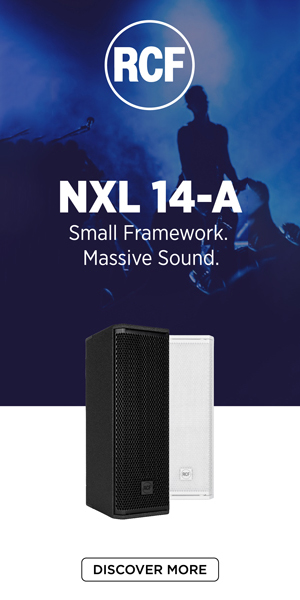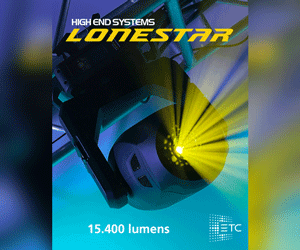When Richmond, VA-based Soundworks took delivery of their Martin Audio WPS and WPC line array systems in February this year, they little knew that the world was within one month of lockdown. “The pandemic shut down all of our bookings from mid-March forward,” recalls CEO, Steve Payne.
The company had to wait until the end of summer for the maiden voyage for both systems. But when it came in the shape of two socially distanced outdoor concerts by the Richmond Symphony Orchestra—it really set tongues wagging.

Soundworks have been contracted to provide sound reinforcement for all Richmond Symphony Orchestra’s community outreach concerts since 2015. “Each season the RSO will incorporate the performance of a popular local or regional artist into one of their ‘Big Tent’ gigs,” he explains.
“The arranger will write scores for orchestral accompaniment to six or so of the guest artist’s songs. Past musical artists have included a wide range of musical styles and genres, and this year’s featured artist was the Commonwealth Bluegrass Band.”

Still to thoroughly road test their new scalable Wavefront Performance rigs, Soundworks used the September 12th show at Maymont Park to evaluate the power of WPS in the delay position with a view to future main FOH deployment.
“The venue required that we cover a depth of 420ft, so we used two hangs of eight WPC for the main PA, with three SXH218 subs ground stacked per side, and two hangs of eight WPS for delays at 220 feet, with a CDD-LIVE 15 at each of the main hangs as outfills.” The audience size was capped at 700, socially distanced.

“The conclusion was that WPS had plenty of impact and presence for use as a main system. We could not be certain that the WPS would be able to punch out to 290 feet as required at the next gig but felt sufficiently confident to give it a try.”
The next show was two weeks later at Pocahontas State Park in Chesterfield, VA, and around 500 socially distanced people were spread over an area that could have accommodated a maximum of 4,000 (standing).

“The performance of the little WPS in this space just seemed to fly in the face of logic and break all the rules,” exclaimed Payne. “There was little doubt that they were entirely capable of serving as mains.
The first time we fired them up at Pocahontas was quite a revelation. The sound and performance were far above what one would expect from an 8” box. The rig did a stellar job of providing even, high fidelity audio out to 290 feet.”
Reflecting on both events, the Soundworks CEO continued, “The area for both concerts, but especially the Maymont Park concert, could accommodate a crowd vastly larger than the safely distanced audience. We do the Richmond Jazz Festival in this same space each year where audience size can approach 7,000. To cover the areas properly we are putting in systems capable of covering approximately 10 times the audience size under normal conditions.”
Seating at the Maymont concert included close seating to the sides of the stage which were out of the pattern of the WPC arrays. “We supplemented these areas with CDD-LIVE 15s on lifts at a height of about 10 feet. We were very pleased with the tonal integration between CDD-LIVE and Wavefront Precision,” he remarked.
Steve Payne himself carried out the venue measurements and system design in Display 2.3. “Due to available amp channels [in the Martin Audio iK amps] both WPC and WPS systems were set to 2-box resolution at Maymont,” he states. “For the Pocahontas Park gig the WPS system was run at 1-box resolution.”

Bryan Hargrave was the system tech and Steve Payne his assistant at both gigs. Jason Misterka mixed FOH at Maymont, while Grant Howard occupied the same role at Pocahontas.
As for the music source, with acoustic bluegrass and orchestral backup they had plenty of headroom in the system. “The sound was full and really pleasing, while the vocals were riding on top of the mix and right in my face. It was as good as I could have wished for.
“Both gigs were acoustic performances and so the real test put to the systems on these gigs was accurate fidelity, even coverage and long throw capability. Max SPL was never tested.”
Martin Audio’s ‘Hard Avoid’ feature worked beautifully at both gigs, he confirmed. “The advantage is especially noticeable with multiple open mics and acoustic instruments on stage. On some systems low mid build-up on stage rolling back off the PA can be a problem and create the need for remedial FOH EQing.”


But in this regard, FOH mixer Grant Howard commented: “Basically all I had to do was shove the faders up. I left the house EQ flat and I barely touched the channel EQ.”
Steve Payne believes the main difference between a socially distanced audience vs. a tightly packed audience is that the system can be run at a 6 to 10dB lower volume to achieve the same result. “I don’t think there is any difference in approach to tuning or Eqing.
“Martin Audio guarantees measured system performance will be within ± 1dB of the performance predicted by Display 2.3. With Wavefront Precision systems we have found that measurement systems such as SMAART are now essentially verifying target performance rather than revealing information to be used for correction. It’s very impressive.”
The Richmond Symphony Orchestra also found it impressive. Stated their Production Manager, Brent Bowden, “Pocahontas sounded fantastic and I heard many positive comments.

“I have heard a number of different line array systems over the years, both indoor and outdoor and some key factors stood out at these shows that I really enjoyed, apart from top notch engineering.
Vocal clarity was noticeable without the dB spike that often results from boosting the human voice above other instruments. The evenness of the level in various locations was also very good, especially difficult in a flat, open park with delays.”
In conclusion, Steve Payne is confident that these systems will soon repay the investment despite sitting idle through the summer’s COVID pandemic. “We expect WPS to be capable of covering 75% of the gigs we used to cover with another manufacturer’s 10” system.
“To get the kind of performance that this system delivers out of a passive, physically diminutive 60lb box with 8” drivers is stunning. The symphony sounded gorgeous at every seat in the house, just stupid good! I am sure it will be the first rig to leave the shop at every opportunity. And of course having both WPC and WPL systems in our warehouse we can easily ramp up the performance whenever required.”
More information on the Martin Audio website








